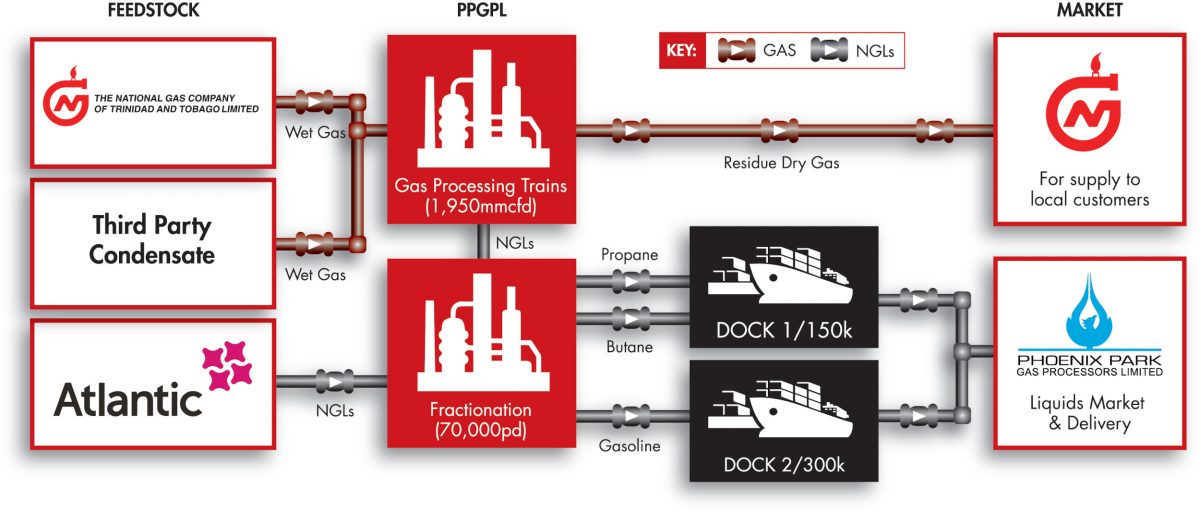PPGPL processes feedstock supplied from NGC by extracting NGLs and fractionating them into three product streams – propane, butane (collectively “liquefied petroleum gas” or “LPG”) and natural gasoline. The plant can process up to 1.95bcf per day of feedstock gas and fractionate up to 70,000 barrels per day of NGLs. The products are stored in on-site storage tanks (at either refrigerated or ambient temperature) prior to being loaded onto marine tankers from loading terminals for transport to customers located in the Caribbean, South American, Central American, and European markets.
PPGPL also has the capacity to split its mixed butane stream into normal and isobutane. PPGPL takes title to the products extracted from the feedstock gas, and the processed “residue gas” is returned to NGC. NGC distributes this residue gas to various end-users operating in the petrochemical, power generation, heavy industry and light industry sectors in Trinidad and Tobago.
PPGPL also fractionates NGLs produced by ALNG’s natural gas liquefaction plants at Point Fortin, located in southwest Trinidad. The resultant products are stored and exported with the products extracted from the feedstock gas from NGC.

Gas Processing
PPGPL operates three cryogenic natural gas processing plants with 1.95bcfd of combined processing capacity. These plants employ a cryogenic cooling process, for the recovery of hydrocarbons from natural gas. The liquid recovery process uses proprietary technology, licensed from Pan West Engineers and Constructors, LLC and Ortloff, designed to cool the natural gas and recover essentially all of the NGLs contained in the natural gas stream.
NGLs Fractionation
PPGPL operates three fractionation plants with the capacity of separating up to 70,000 bpd of NGLs. The fractionation facilities separate the NGLs mixture received from the gas plants into propane, mixed butane, isobutane and natural gasoline. The company is also supplied NGLs from ALNG, which are fractionated together with NGLs extracted from natural gas from NGC.
Storage and Shipping
PPGPL’s products are stored in specialized tanks where PPGPL builds inventory until the products are shipped in ocean-going tankers to its customers. The company currently has an overall storage capacity of approximately 1,250,000 barrels. Its storage capacity allows PPGPL to better manage the impact of market volatility and provides some flexibility to mitigate risks related to business disruptions.
PPGPL operates two product-loading docks, with up to 54,000 cubic meters (cbm) of capacity and overall loading capacity of up to 10,000 barrels per hour, capable of handling large ships with a carrying capacity of up to 300,000 bbls. These marine export terminals enable PPGPL to export products in large cargo sizes to the North American and South American markets, as well as to ship smaller LPG shipments to the Caribbean LPG market. One of the dock facilities is owned by PPGPL, while the other is operated under a long-term lease agreement with Yara Trinidad Limited.
Outstanding Operational Performance
PPGPL has had an outstanding operational record since its formation. Its plants have been operating at an average uptime of over 97%, despite the increase in age-related maintenance requirements.
Exceptional Safety Record
PPGPL’s operations are managed by skilled plant personnel who are dedicated to performance and safety. As a result, the company has a strong safety track record. It has continuously maintained its position as a leader in safety and environment management in the local energy sector and has ranked among the best in the international gas processing industry. The adherence to high safety standards has helped PPGPL to keep its operational disruption costs low.
PPGPL has recorded many notable achievements and industry acclaim in its history for its stellar safety record, having won the Gas Processing Association (GPA) Safety Award Division II for 21 years.

